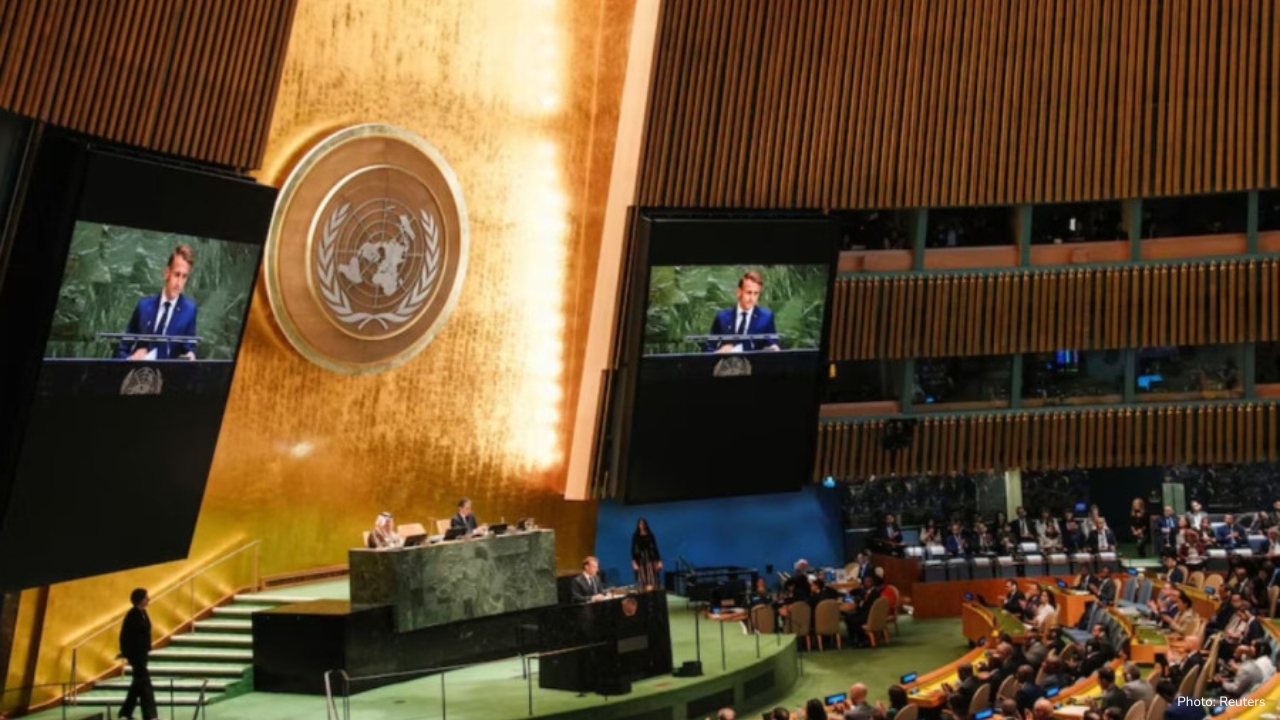
Stay Young and Radiant: 10 Vegetarian Foods That N
Discover the top 10 vegetarian foods to naturally boost collagen and stay young. Learn how plant-bas

On September 22, 2025, a major international summit was held in New York City, hosted jointly by France and Saudi Arabia, focused on the ongoing Israeli-Palestinian conflict.
This summit brought together world leaders, diplomats, and representatives from countries across the globe to discuss a two-state solution, a plan aimed at establishing a peaceful coexistence between Israel and a new, internationally recognized Palestinian state.
The summit took place at a time when tensions in the region remain high. Gaza, the West Bank, and parts of Israel have experienced ongoing violence, settlement expansion, and political instability. The goal of the summit was not just diplomatic discussion but also to encourage tangible steps toward peace, particularly through international recognition of Palestine.
Growing Global Support for Palestinian Statehood
Over the past year, several countries have formally recognized Palestine as an independent state. This marks a significant change in international relations concerning the Middle East. Countries such as the United Kingdom, Canada, Australia, and Portugal have extended recognition to Palestine, signaling a shift in global diplomacy.
This trend is seen as a renewed push for a two-state solution, a framework that has been challenged since the 1993 Oslo Accords. Those agreements originally outlined a path to establish a Palestinian state alongside Israel, but progress has stalled due to political disagreements, conflict, and territorial disputes.
At the summit, leaders from many nations expressed their support for Palestinian statehood. France’s Foreign Minister Jean-Noel Barrot emphasized that recognizing Palestine would help isolate militant groups like Hamas and strengthen efforts to achieve peace. He stated that formal recognition is not an act against Israel but rather a step toward encouraging negotiations and stability in the region.
Similarly, Norway’s Foreign Minister Espen Barth Eide noted that international recognition of Palestine reflects the growing consensus in the global community but also warned that the situation in Gaza and the West Bank remains severe. Ongoing violence, humanitarian crises, and settlement expansions continue to create obstacles to lasting peace.
Opposition from Israel and the United States
Despite the rising international support for Palestinian statehood, Israel and the United States remain strongly opposed to unilateral recognition of Palestine.
Israeli Prime Minister Benjamin Netanyahu has consistently rejected the idea of a Palestinian state under current conditions, arguing that such recognition would compromise Israel’s security.
During the summit, Israeli officials refused to participate. Israeli Ambassador Danny Danon criticized the gathering, calling it a “circus” and insisting that Israel will not negotiate under pressure from countries seeking unilateral recognition.
The United States, a key ally of Israel, also chose not to attend the summit. U.S. officials have repeatedly expressed concerns that unilateral recognition of Palestine could undermine direct negotiations between Israel and Palestine and destabilize the region further. The U.S. continues to support a negotiated two-state solution rather than international declarations, emphasizing that any agreement should be reached through dialogue between the parties involved.
Saudi Arabia and France, as hosts, actively encouraged countries to recognize Palestine and provide diplomatic and humanitarian support, seeing international recognition as a way to revive peace efforts.
This diversity of opinions highlights the complexity of international diplomacy in the Middle East. While some nations see recognition as a tool to strengthen peace, others fear it could inflame tensions and disrupt negotiations.
Why Recognition Matters
Humanitarian and Political Challenges
The summit also addressed the ongoing humanitarian situation in Gaza and the West Bank. Millions of Palestinians face limited access to clean water, healthcare, and electricity, while political instability and periodic outbreaks of violence exacerbate daily life.
Settlement expansion in the West Bank remains a contentious issue. Israeli settlements on land claimed by Palestinians are considered illegal under international law by many countries, though Israel disputes this. These settlements complicate efforts to establish a contiguous Palestinian state and undermine trust between negotiating parties.
Leaders at the summit emphasized that recognizing Palestine should be paired with humanitarian assistance, development projects, and international monitoring, ensuring that recognition translates into improved living conditions and greater security.
Political Impact and Global Diplomacy
The summit reflects a shift in global diplomacy. As more countries recognize Palestine, the pressure increases on Israel and the United States to reconsider their positions. While Israel insists on security guarantees and direct negotiations, global support for Palestine signals growing frustration with stalled peace talks.
The summit also highlighted the role of middle powers like France and Saudi Arabia in mediating conflicts. By hosting the meeting, these countries positioned themselves as leaders in advocating for peace, seeking to balance diplomatic influence between Israel, Palestine, and other global actors.
International recognition can also affect United Nations initiatives, giving Palestine a stronger voice in global forums and allowing it to participate more effectively in multilateral discussions on trade, development, and security.
Reactions from Palestinian Leadership
Palestinian leaders welcomed the summit and the recognition from supportive countries. They emphasized that formal acknowledgment by the international community strengthens their claim to statehood and encourages a return to negotiations under fair terms.
Palestinian officials also noted that international recognition could lead to increased funding for infrastructure, education, and healthcare, which are critical for stability and development in the region. Recognition, combined with practical support, can help build institutions that enable a viable, sovereign Palestinian state.
Obstacles to a Two-State Solution
These challenges mean that recognition alone is not sufficient. A lasting two-state solution requires sustained negotiations, mutual trust, and international support to address both political and humanitarian issues.
Moving Forward
The summit represents an important step in international diplomacy. It shows that despite opposition, global support for Palestinian statehood is growing. Recognition by countries such as the UK, Canada, Australia, and Portugal may encourage further diplomatic efforts, putting pressure on Israel and its allies to engage in meaningful negotiations.
Observers noted that while immediate solutions are unlikely, the summit sets a precedent for continued international involvement. It highlights that the world is watching the Israeli-Palestinian conflict and that global consensus can influence the course of negotiations.
The UN summit on September 22, 2025, in New York marks a key moment in the pursuit of a two-state solution for Israel and Palestine. By promoting international recognition of Palestine, the summit seeks to revive diplomatic efforts, encourage peaceful negotiations, and provide humanitarian and political support to the Palestinian people.
While Israel and the United States oppose unilateral recognition, the growing number of supportive countries reflects a shift in global attitudes toward the conflict. The path to peace remains complex and challenging, but international support for a Palestinian state demonstrates a willingness among the world community to explore new ways of achieving lasting stability and coexistence in the region.
As negotiations continue, the coming months will be crucial in determining whether the momentum from the summit translates into practical steps toward a two-state solution, with secure borders, mutual recognition, and improved conditions for all citizens living in Israel and Palestine.